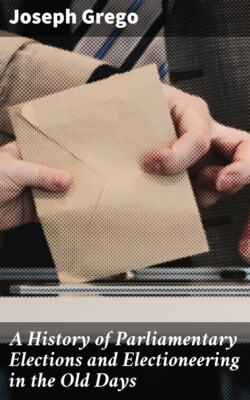Читать книгу A History of Parliamentary Elections and Electioneering in the Old Days - Joseph Grego - Страница 38
На сайте Литреса книга снята с продажи.
Оглавление“The leaden crown devolved on thee,
Great poet of the hollow tree.”
“But the Duchess of Marlborough had kept one, and when he was against her at an election, she had a new edition of it printed, and prefixed to it, as a frontispiece, an elephant dancing on a rope; to show that his Lordship’s writing comedy was as awkward as an elephant dancing on a rope.”37
It was so much a matter of course that everything in a man’s life should tell against him, if he had the temerity to stand for parliament, that Johnson, when interrogated by Boswell, “whether a certain act of folly would injure a friend of theirs for life?” replied, “It may perhaps, sir, be mentioned at an election,”—the duchess’s feat probably presenting itself to Johnson’s mind at the time.
Hannay, in his sparkling essay on “Electioneering,” also relates the following:—“Mamma,” said a young candidate to his parent in deep confidence, one nomination day, “tell me truly, is there anything against my birth?”—an ingenious precaution in view of eventualities which the youth not imprudently employed to prepare himself for the worst, and that he might not he taken by surprise at the hustings.
The Tories were forced, after their failure to proclaim the Pretender as successor to Queen Anne, to subscribe their loyalty on the accession of George I. This they did with a reservation, as hinted by their opponents, who now held the good things of the administration:—
“Your fathers, like men, who had thoughts of a Heaven,
Took the Oaths in the Sense in which they were given;
But you, like your Brethren the Jesuits, can find
A way to evade all the ties of mankind,
So that nothing but Halters your faction can bind.”
It was not without reasonable suspicions of the Jacobite party that the ministers of George I. deemed it prudent to keep the Commons they had, rather than face a fresh election, since a general mistrust was abroad. From an effusion upon the bell-ringing in 1716, on the anniversary of Queen Anne’s coronation, it appears this tribute of respect to the memory of the late sovereign was regarded as a Tory manifesto:—
“ ’Tis Nancy’s Coronation Day
By whom ye hop’d to bring in play
Young George, the Chevalier.
But Fate, who best disposes things,
And pulls down Queens and sets up Kings,
A better George sent here.”
According to the lyrist, the papists were tired of praying for Walpole’s abrupt end; but the conclusion exhibits the feeling then prevailing—and which was justified by after-events—that the prolonged sessions of parliament under the new Septennial Act offered some defence against the schemes of their opponents; in fact, the tables were turned, and the Whigs of this parliament dreaded the machinations of the Tories, much as the Abhorrers and courtiers detested and feared the Whigs under Charles II.
“But now they utter loud complaints,
And curse all male and female saints,
Walpole still lives, their curb;
And four long years, at least, must come,
Ere French pistoles, and friends to Rome,
Our Liberties disturb.”
The Pretender, whose cause looked hopeful at the time of his “dear sister’s” decease, was treated by the Whig satirists with all the ridicule their pens could command:—
